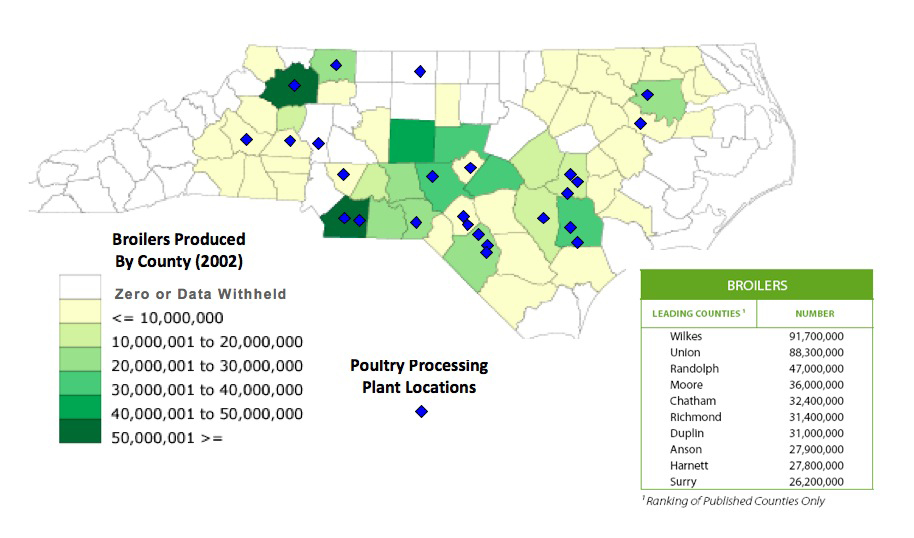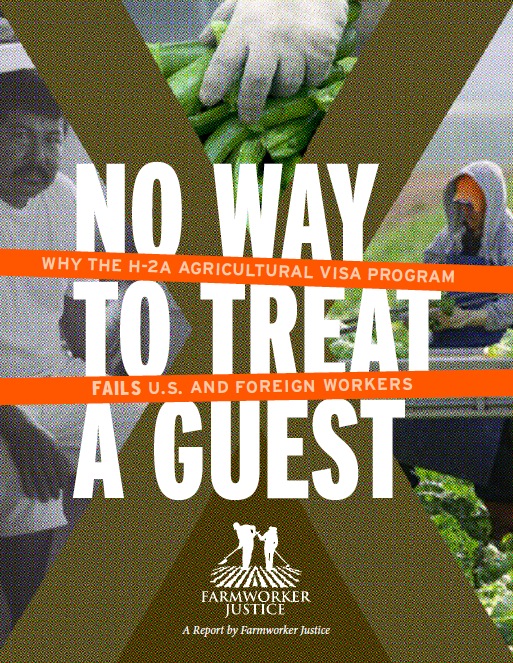Learn More about Poultry Workers
Click here to read the special report by the Charlotte Observer: The Cruelest Cuts - the Human Cost of Bringing Poultry to Your Table.
There are approximately 28,000 poultry processing workers in North Carolina.
This past year, the North Carolina poultry industry raised and slaughtered 713,017,000 broilers (i.e. meat chickens), producing 3,723,730,000 lbs. of chicken meat in the process. This made North Carolina 4th in the nation in both of these areas (behind Georgia, Arkansas, and Alabama, respectively).
In 2006 (the most recent year for which such data is available), the chicken meat industry generated $2,088,212,000 in cash receipts for North Carolina – a figure which represents 25.5% of the total agricultural take for the year, tobacco included. When other portions of the poultry industry are added to the mix (e.g. turkeys, chicken eggs, etc.), those figures jump to $2,911,615,000 and 35.5%, respectively.

Injuries
- Workers’ hands become so damaged from carpal tunnel syndrome and other musculoskeletal disorders that they become unable to grab a spoon, button their shirt or pick up a glass of water.
- According to OSHA about 100 poultry workers have been killed on the job in the past decade and over 300,000 have been injured. This is a rate higher than that of manufacturing as a whole.
- A House of Raeford plant in NC showed a low injury rate of 3.5/ 100 workers, suspiciously below the 16.6/100 worker average that government statistics track—a rate that is criticized by workers and advocates as artificially low in itself.
- OSHA officials admit that 2-3 times as many injuries have probably gone unreported.
- OSHA inspections of poultry plants have dropped to their lowest rate in 15 years.
- Fines for serious violations—including conditions that could case death or disabling injuries—are usually cut by more than half, to an average of $1100 (found the Charlotte Observer investigators in NC). “Tyson Foods, a multi-billion dollar company, makes that much profit every 3 minutes,” Observer reporters wrote.
- In a Duke University study conducted by epidemiologist Dr. Hester Lipscomb, of 300 workers interviewed, 43% reported symptoms of musculoskeletal disorders.
- Similarly, in a Wake Forest University study conducted by Dr. Sara Quandt 46% of poultry workers surveyed reported problems with their arm, wrist or hand.
- Employers are no longer required to track injuries that are caused by repetitive work.
- Government is inspecting poultry plants less because fewer injuries are being reported, yet it rarely checks to see if these reports are accurate. This has led to the House Labor and Education Committee to call for a hearing on OSHA record keeping.
Silencing Workers
- In a Duke University study conducted by epidemiologist Dr. Hester Lipscomb, of 300 workers interviewed, 89.3% rated the possibility of possibility of being injured at work in the next 12 months very likely;
- only 19% said that supervisors did as much as possible to make their job safe, whereas 64.5% said that they felt their supervisors were only interested in doing the job fast and cheap;
- Workers who complain are often told the door is open for them to leave and that there are hundreds of others waiting for their job
- Job turnover is over 100% per year
- The rise of safety-incentive programs discourages workers from reporting injuries. These programs typically function where workers are awarded for reaching certain production goals without any reported lost work time injuries. Workers are rewarded with prizes varying from a free chicken lunch to T-shirts, gift certificates, bonus pay or even an entry into a raffle to win a free pick up truck. Workers put pressure on their fellow workers not to report injuries so that they don’t blow their chance for the whole department to win the prize.
Facts from "North Carolina's Poultry Industry by the Numbers."
Download the fact sheet for references.










